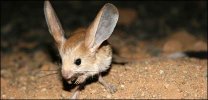Peter Parka
Well-Known Member
Mysterious mammal caught on film
By Rebecca Morelle
Science reporter, BBC News



An "extraordinary" desert creature has been caught on camera for what scientists believe is the first time.
The long-eared jerboa, a tiny nocturnal mammal that is dwarfed by its enormous ears, can be found in deserts in Mongolia and China.
Zoological Society of London (ZSL) scientist Jonathan Baillie said the footage was helping researchers to learn more about the mysterious animal.
The species is classified as endangered on the IUCN Red list.

The unusual animals were filmed in the Gobi desert during an expedition led by Dr Baillie.
Until now, the creatures had proven extremely difficult to study, thanks to their minuscule size, nocturnal nature and the harsh desert environment that they inhabit.
Big ears
Dr Baillie told BBC News that he was "ecstatic" to have tracked down the jerboas.
"These creatures hop just like a kangaroo; it is amazing to watch. Little hairs on their feet, almost like snow shoes, allow them to jump along the sand," he explained.


"And in terms of mammals, they have one of the biggest ear-to-body ratios out there."
The footage revealed that the creatures spend daylight hours burrowed down in underground tunnels beneath the sand, and that their diet was mostly made up of insects.
"The long-eared jerboa is a bit like the Mickey Mouse of the desert, cute and comic in equal measure," Dr Baillie said.
By setting pitfall traps, the researchers were also able to look at the rodents close-up and to begin to estimate their population.
He added that although there was still much to learn about the rare rodent it was already believed to be under threat from habitat disturbance.
"We travelled to the Gobi to find out about the animal's status and learn more about it so we can develop a thorough long-term action plan."
Desert bounties
The expedition formed part of ZSL's Edge programme, which focuses its efforts on conservation plans for animals that are both endangered and evolutionary distinctive.
The long-eared jerboa is one of 10 species that the programme is looking at this year.


"These amazing, remarkable creatures are on the verge of extinction and we know almost nothing about them," warned Dr Baillie.
He added that it was important not to overlook desert habitats in conservation.
"Everyone thinks the desert is a totally desolate area, void of biodiversity, and often when conservation planning is done, deserts are overlooked.
"But there are some remarkable species in the desert, so we really need to start paying attention to this environment."
An Edge scientist has now been appointed to further study the species.
BBC
By Rebecca Morelle
Science reporter, BBC News



An "extraordinary" desert creature has been caught on camera for what scientists believe is the first time.
The long-eared jerboa, a tiny nocturnal mammal that is dwarfed by its enormous ears, can be found in deserts in Mongolia and China.
Zoological Society of London (ZSL) scientist Jonathan Baillie said the footage was helping researchers to learn more about the mysterious animal.
The species is classified as endangered on the IUCN Red list.

The unusual animals were filmed in the Gobi desert during an expedition led by Dr Baillie.
Until now, the creatures had proven extremely difficult to study, thanks to their minuscule size, nocturnal nature and the harsh desert environment that they inhabit.
Big ears
Dr Baillie told BBC News that he was "ecstatic" to have tracked down the jerboas.
"These creatures hop just like a kangaroo; it is amazing to watch. Little hairs on their feet, almost like snow shoes, allow them to jump along the sand," he explained.


"And in terms of mammals, they have one of the biggest ear-to-body ratios out there."
The footage revealed that the creatures spend daylight hours burrowed down in underground tunnels beneath the sand, and that their diet was mostly made up of insects.
"The long-eared jerboa is a bit like the Mickey Mouse of the desert, cute and comic in equal measure," Dr Baillie said.
By setting pitfall traps, the researchers were also able to look at the rodents close-up and to begin to estimate their population.
He added that although there was still much to learn about the rare rodent it was already believed to be under threat from habitat disturbance.
"We travelled to the Gobi to find out about the animal's status and learn more about it so we can develop a thorough long-term action plan."
Desert bounties
The expedition formed part of ZSL's Edge programme, which focuses its efforts on conservation plans for animals that are both endangered and evolutionary distinctive.
The long-eared jerboa is one of 10 species that the programme is looking at this year.


"These amazing, remarkable creatures are on the verge of extinction and we know almost nothing about them," warned Dr Baillie.
He added that it was important not to overlook desert habitats in conservation.
"Everyone thinks the desert is a totally desolate area, void of biodiversity, and often when conservation planning is done, deserts are overlooked.
"But there are some remarkable species in the desert, so we really need to start paying attention to this environment."
An Edge scientist has now been appointed to further study the species.
BBC




